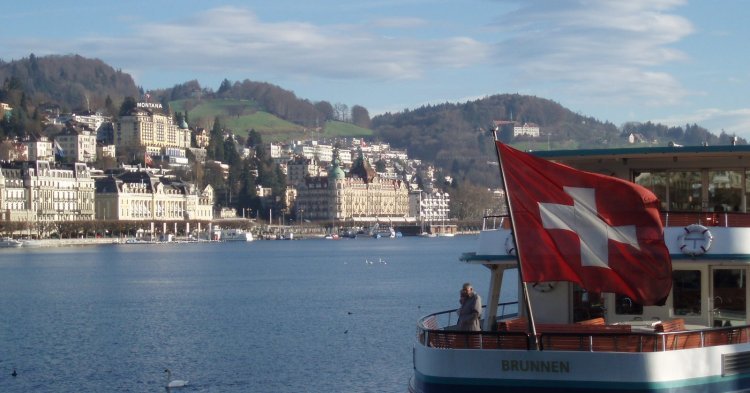When the monetary and financial system in Europe stumbled on the brink of catastrophe in 2011 and EU leaders spent more time in negotiation rooms in Brussels than in any other period of time in recent memory, Swiss politicians seemed too busy to bother running their (re-)election campaigns. Even more worrisome, this rather surreal behaviour towards the EU cannot be seen as an exception. On the contrary, it appears that Swiss politicians have completely lost track of reality when it comes to EU-Switzerland relations in the last decade. How did this happen and is there any change to be expected anytime soon?
Decade of cold integration
Following the momentous rejection of the EEA treaty in a popular referendum in 1992, Switzerland’s official policy towards Europe is based on a set of mostly static, sectoral bilateral treaties (more than 120 by now). The main aim is to gain as much access to the Common Market as possible while safeguarding as much sovereignty as feasible. This strategy proved pretty successful over the last decade. Today, Switzerland enjoys almost full access to the Common Market and thanks to its Schengen and Dublin membership, it is more integrated into the EU than some member states. But this institutional arrangement comes at the price of Switzerland being a passive second-class member of the EU. In order to avoid discrimination, a vast part of the EU legislation is translated de facto automatically into Swiss domestic law, often without changes. Thereby, the very idea of preserving sovereignty is perversely hollowed out over time. And since accepting ECJ decisions are a no-go, Switzerland becomes an unreliable partner for the EU as it insists – the treaties currently in force mostly being static – on different rules for the same Common Market. As a consequence, the European Council demanded a change of rules in the Swiss-EU relations in 2009, setting the pace for a “more advanced” mood of cooperation in which EU legislation is translated automatically and ECJ decisions are binding. Unsurprisingly, the Federal Council (national government) was less fond of the idea and delayed any serious answer with reference to the 2011 election.
New Foreign Minister = New European Policy?
This November, the aforementioned federal elections produced a surprise loss for the rightwing-conservative, anti-EU Swiss People Party (SPP) at the expense of centrist and leftist parties. For the first time in two decades, the party’s anti-EU campaigning did not succeed, leaving it decisively weakened in the federal parliament. Consequently, the federal parliament elected no additional SPP representative to the Federal Council in December, leaving the largest party nominally underrepresented in the federal government, contrary to informal Swiss political tradition.
After the elections, a new Foreign Minister was named. Didier Burkhalter, a politician from the liberal (centre-right) party will succeed the longstanding Micheline Calmy-Rey (social-democrats). Mr. Burkhalter belongs to the Federal Council since 2009 and is originally from the French-speaking canton of Neuchâtel. He is the first liberal Foreign Minister since 1961, when the late Max Petitpierre, also from Neuchâtel and a father of the European Free-Trade Association (EFTA), stepped down. On paper, Mr. Burkhalter is a defender of the ‘bilateral approach’, but his background evokes hopes for pro-EU activists. Neuchâtel is known as one of the most EU-friendly places in the country; its cantonal government officially demands the start of immediate accession negotiations! In addition, judging from his record in the Federal Council, Mr. Burkhalter proved to be open-minded towards all reasonable ideas and to be efficient in dealing with special interest groups and in convincing parliamentarians as well as voters.
Sort out the “institutional questions” first
But will change in staff also bring about change in policy? My estimate is yes, but not instantly. Non-involvement and the romanticisation of national sovereignty still dominate Swiss foreign policy. But history shows that priorities may change due to external pressure. And this kind of pressure is being built up at the moment. The EU now clearly demands a solution on the so-called “institutional questions” (ie. dynamic translation of EU legislation, homogeneous application of agreements and an independent judicial control mechanism) before any new sectoral agreement may even be discussed. Furthermore, the Commission gives Switzerland a hard time in issues such as bank secrecy and fiscal regimes for holding companies. At the same time, domestic interest groups are pushing harder for new market-access granting agreements (ie. energy). The Swiss standard procedure of sitting out conflicts relying on the other party eventually giving in seems therefore no longer feasible. Since the Treaty of Lisbon, the EU is acting much more coherent, unwilling to grant special regimes to third parties. Additionally, the status quo with no tailor-suited adaptations is economically more damaging to Switzerland than the EU in the long run. Hence, the Federal Council and its new Foreign Minister must develop new strategies.
In any case, a mode has to be found in which Switzerland fulfils the EU conditions on the “institutional questions”. This means that either a regime similar to the EEA has to be developed or full membership must be reconsidered. I imagine that the Federal Council promotes an EEA-like solution rather than full membership. Both have downsides in the eyes of sovereignty-purists (as does the current framework), but only the EEA-like approach currently enjoys a slim chance of passing in a popular vote. Furthermore, such a deal would also have to include “sweeteners” such as an agreement on energy or taxes. A big bargain deal is more likely to be supported by crucial interest groups such as corporate and trade unions.
In Switzerland, being a “liberal” is still an advantage
Mr. Burkhalter may play a crucial role in this policy reassessment. Not only will he be the one to negotiate directly with EU institutions, but he also has to convince the Swiss people to support this policy shifts. Within the Federal Council as well as in public debates, Mr. Burkhalter will face less opposition than his social-democratic predecessor in promoting “more integration” thanks to his liberal background. He should use his leverage wisely in order to explain more clearly the advantages and disadvantages of the two different options, EEA-like regime and full membership. Even more, he should develop a visionary EU strategy and spark the interest of Swiss citizens to participate actively in shaping our continent. He should see his role as the focal point of a wide debate, involving internal as well as external issues related to Switzerland’s EU policy.
Still, how are you going to win over the public? Not such a big deal, eventually. Once given the full and undistorted picture, Swiss voters tend to vote pragmatically and proved to be much more flexible ideologically than previously anticipated. One example was the successful popular vote on the UN accession in 2002 (a first vote failed in 1986). An EEA-like regime might stand a better chance of passing, but its significant drawbacks in terms of democracy might stop it from being approved. Therefore, it is not to be foreclosed that Swiss voters, after a profound national debate on Switzerland’s role in Europe, as federalists favour, would actually opt for a direct participation in the European project rather than for another ‘second-class-plus’ option. Such a decision would not astonish completely since the conviction that participation and representation are crucial in democracies were at the very core of the “Swiss integration project”, guiding the way to the creation of the modern Swiss Federal Confederation in 1848!


Follow the comments: |
|
